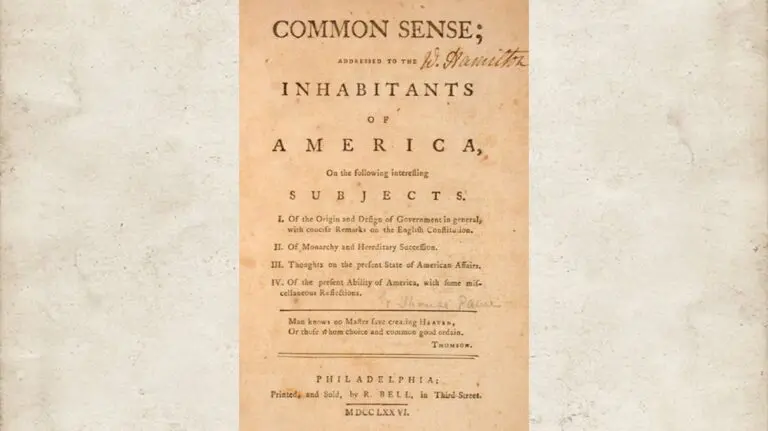
Common sense isn’t so common anymore. A friend pointed this out to me. We discussed the concept at length, but we could not come to an agreement. I kept thinking the old way, that our society has much in common, but that has changed. Now we just have our individual senses, yet they’re anything but common. My friend was right!
Diversity is said to be a good thing today, and this is true. However, that should include not only diversity of race and culture, but also diversity of ideas and thought. Differences in culture and race were evident in the 18th century in colonial America prior to the Revolutionary War. Diversity of culture was certainly present in religion between colonies, but the idea of independence was intolerable for England’s dominant ambitions; and even in the colonies there was disagreement on whether to secede from England or to seek representation for American interests within the established English system of governance.
Why? Because we were young colonies of English immigrants, indigenous Indians, other Europeans, slaves; and we were to become a country of undiscovered territories of unknown inhabitants.
However, Thomas Paine was very successful in homogenizing the colonists’ thoughts with his pamphlet “Common Sense”, which was distributed just 5 months before the Declaration of Independence was signed. Yet, it was the world’s first attempt for the common man to give his consent to be governed by the election of representative agents, which was naturally appealing to all diverse races and cultures seeking opportunity in the New World. The Declaration and Thomas Paine made it clear that consent could be rescinded; and heredity of the elite to govern was no match for the merit of the representation of productive common people.
I am not saying that, since that time, our interests as Americans have been held common or that every race had the opportunity to participate in equal representation. Nevertheless, Paine’s common sense, started in the colonies, remained at the center of American thought throughout the 19th Century; but not without its challenges and corrections, which included a civil war to address the issue of equal opportunity to own property. In other words, the right to ownership of self (abolition of slavery) and as necessary – individual granular control of capital, free trade of goods, innovation, and ideas.
After the war, most Americans had an understanding of our founding principles of opportunity regardless of actual practice by the powerful, if only from a self interest point of view regarding human rights and socially acceptable behavior. The ideas that sovereignty, subsidiarity of states, and autonomous people would eventually create a prosperous and independent middle class became a realized goal in the next century without truly understanding how we got there. Immigration and diversity of culture were still on the rise, but what unified common people was voluntary cooperation and our respect for human and property rights codified in the original US Constitution.
Something changed around the early part of the 20th century. American universities attained a great deal of status along with advances in technology and innovation; but with that status, individuals in academia earned accolades and credentials. Common sense sometimes took a backseat to our awe of the well-educated.
Over decades our focus on common sense applied to utility incrementally shifted with the increased abundance of a dynamic free market. Americans gradually had more free time for leisure, so our attention turned toward our imaginations, entertainment, celebrity, and what authority could guarantee as more distractions and greater consumption with less effort. Many concluded that of course the authority must be well credentialed, established, and educated. An idea that hung on from the 19th Century and still hangs on – the American ignoble nobility.
Meanwhile, the elite were hard at work changing the narrative with a Malthusian message and explaining to our youth in academies that the pie of abundance was a static amount. Limited resources, climate disaster, capitalism, and over-consumption were destroying the planet. Since this messaging has led to the limiting of opportunity through applied public policy, but students are still indoctrinated to believe that the limits are the result of too much freedom and not enough government. Yet they can still be whatever they want to be regardless of nature’s limits – like for instance their biological sex.
Education has devolved to the point whereby much of it is unrecognizable to the common man. Much of its subject matter now exists for its own sake. Inept governments use academia as intellectual cover to bolster destructive policy, and public and private funds are lavishly spent in universities by a people still in awe of a legacy of profound knowledge and innovation that is unfortunately eroding awayed.
In the 21st century, we just have our subjective senses for observation, absent of any substantial conclusion or an understanding of Paine’s classic “common sense”. We are lacking conviction of obvious evidence in exchange for the safety of tolerance de jour and muffled silence. We leave our conclusions of meaning for which the elites attend with intolerance, and their supporters parrot.
Yes, you do you and I’ll do me, but if the majority of us cannot have some values in common and resist vocally the assault on God-given liberties to ourselves and others, then our republic and civilization is lost.
America once had the common sense to aspire to the values of liberty, and for most Americans those values were rooted in natural law, Western culture, and biblical wisdom. That is what drew people to our shores and was memorialized in the Statue of Liberty on Ellis Island by admirers from France. Today some legal and illegal immigrants to the US are not only seeking liberty, but escaping tyranny. Some are still applying through a broken immigration process that has become a political football from one “Super Bowl-rule-u-cratic“ administration to the next.
Liberty matters not to many leaders who gave an oath to protect our borders, our US Constitution, and all citizens, who notably polled 74% in favor of a more secure border. When the leaders lose their integrity and the governed forfeit their consent and courage, it takes a simple innocent child with innate common sense, untarnished by a corrupt culture, to declare that the emperor has no clothes.

Articles posted on LCI represent a broad range of views from authors who identify as both Christian and libertarian. Of course, not everyone will agree with every article, and not every article represents an official position from LCI. Please direct any inquiries regarding the specifics of the article to the author.
Did you read this in a non-English version? We would be grateful for your feedback on our auto-translation software.
), //libertarianchristians.com/wp-content/plugins/smartquizbuilder/includes/images/template6-latest.jpeg))

), https://libertarianchristians.com/wp-content/plugins/smartquizbuilder/includes/images/template6-latest.jpeg))








































), https://libertarianchristians.com/wp-content/plugins/smartquizbuilder/includes/images/template6-latest.jpeg))
), https://libertarianchristians.com/wp-content/plugins/smartquizbuilder/includes/images/template6-latest.jpeg))
), https://libertarianchristians.com/wp-content/plugins/smartquizbuilder/includes/images/template6-latest.jpeg))





*by signing up, you also agree to get weekly updates to our newsletter
Sign up and receive updates any day we publish a new article or podcast episode!